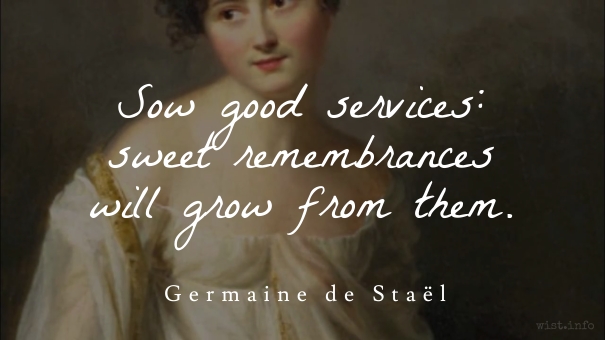Sow good services: sweet remembrances will grow from them.
Quotations by:
De Stael, Germaine
Travelling, whatever may be said of it, is one of the saddest pleasures of life. When you feel yourself settled in some foreign city, it begins to feel, in some degree, like your own country; but to traverse unknown realms, to hear a language spoken which you hardly comprehend, to see human countenances which have no connection either with your past recollections, or future prospects, is solitude and isolation, without dignity and without repose.
[Voyager est, quoi qu’on en puisse dire, un des plus tristes plaisirs de la vie. Lorsque vous vous trouvez bien dans quelque ville étrangère, c’est que vous commencez à vous y faire une patrie; mais traverser des pays inconnus, entendre parler un langage que vous comprenez à peine, voir des visages humains sans relation avec votre passé ni avec votre avenir, c’est de la solitude et de l’isolement sans repos et sans dignité.]
Germaine de Staël (1766-1817) Swiss-French writer, woman of letters, critic, salonist [Anne Louise Germaine de Staël-Holstein, Madame de Staël, Madame Necker]
Corinne, Book 1, ch. 2 (1807) [tr. Lawler]
(Source)
Love is the emblem of eternity; it confounds all notion of time; effaces all memory of a beginning, all fear of an end: we fancy that we have always possessed what we love, so difficult is it to imagine how we could have lived without it.
Germaine de Staël (1766-1817) Swiss-French writer, woman of letters, critic, salonist [Anne Louise Germaine de Staël-Holstein, Madame de Staël, Madame Necker]
Corinne, Book 8, ch. 2 (1807) [ed. Hill (1833)]
Alt. trans.: "It is certainly through love that eternity can be understood; it confuses all thoughts about time; it destroys the ideas of beginning and end; one thinks one has always been in love with the person one loves, so difficult is it to conceive that one could live without him." [tr. Raphael (1998)]
It seems to me that life’s circumstances, being ephemeral, teach us less about durable truths than the fictions based on those truths; and that the best lessons of delicacy and self-respect are to be found in novels where the feelings are so naturally portrayed that you fancy you are witnessing real life as you read.
The voice of conscience is so delicate that it is easy to stifle it; but it is also so clear that it is impossible to mistake it.
Germaine de Staël (1766-1817) Swiss-French writer, woman of letters, critic, salonist [Anne Louise Germaine de Staël-Holstein, Madame de Staël, Madame Necker]
Germany [De l’Allemagne], Part 3, ch. 13 (1813)
(Source)
Wit lies in recognizing the resemblance among things which differ and the difference between things which are alike.
[L’esprit consiste à connaître la ressemblance des choses diverses et la différence des choses semblables.]
The sense of this word among the Greeks affords the noblest definition of it; enthusiasm signifies God in us.
The rules are only barriers to keep children from falling.
[Ces règles ne sont que des barrières pour empêcher les enfants de tomber.]
There is no arena in which vanity displays itself under such a variety of forms as in conversation.
[Il n’est point d’arène où la vanité se montre sous des formes plus variées que dans la conversation.]
Germaine de Staël (1766-1817) Swiss-French writer, woman of letters, critic, salonist [Anne Louise Germaine de Staël-Holstein, Madame de Staël, Madame Necker]
Germany [L’Allemagne], Part 1, ch. 11 “Of the Spirit of Conversation” (1813)
(Source)
(Source (French)).
Sometimes misattributed to Marguerite Gardiner (Lady Blessington), due to this quote (there attributed to de Stael) being included in the Preface to R. R. Madden, The Literary Life and Correspondence of the Countess of Blessington, Vol. 1 (1855).
Life often seems like a long shipwreck, of which the debris are friendship, glory, and love; the shores of existence are strewn with them.
I believe that happiness consists in having a destiny in keeping with our abilities. Our desires are things of the moment, often harmful even to ourselves; but our abilities are permanent, and their demands never cease.
Germaine de Staël (1766-1817) Swiss-French writer, woman of letters, critic, salonist [Anne Louise Germaine de Staël-Holstein, Madame de Staël, Madame Necker]
Reflections on Suicide (1813)
(Source)
We cease loving ourselves if no one loves us.
[On cesse de s’aimer si quelqu’un ne nous aime.]
One must, in one’s life, make a choice between boredom and suffering.
Germaine de Staël (1766-1817) Swiss-French writer, woman of letters, critic, salonist [Anne Louise Germaine de Staël-Holstein, Madame de Staël, Madame Necker]
Letter to Claude Hochet (Summer 1800)
Quoted in J. Christopher Herold, Mistress to an Age: A Life of Madame de Staël (1958). Herold added, "Her decision was emphatically in favor of suffering, which after all was a pleasure compared to boredom."
Politeness is the art of choosing among one’s real thoughts.
Germaine de Staël (1766-1817) Swiss-French writer, woman of letters, critic, salonist [Anne Louise Germaine de Staël-Holstein, Madame de Staël, Madame Necker]
Quoted in Abel Stevens, Madame de Staël, Vol. 1, ch. 4 “Early Character” (1880)
(Source)
Stated as a possible paraphrase: "It was a maxim with her that politeness is the art of choosing among one's real thoughts."
A voyage without companionship, that is to say without conversation, is one of the saddest pleasures of life.
Germaine de Staël (1766-1817) Swiss-French writer, woman of letters, critic, salonist [Anne Louise Germaine de Staël-Holstein, Madame de Staël, Madame Necker]
Quoted in Margaret Goldsmith, Madame de Staël (1938)
See also here.



